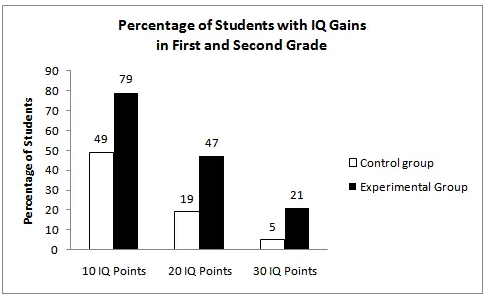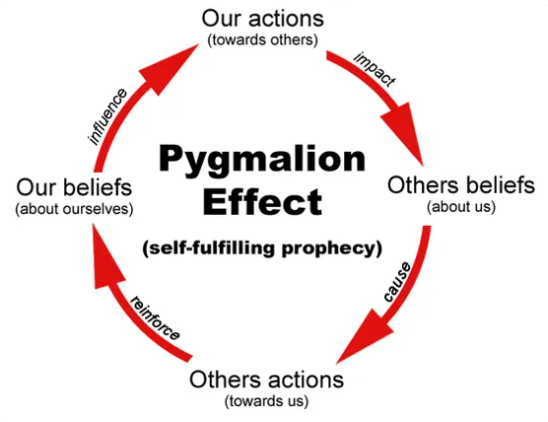How Can I Manage My Expectations?

Expectations can be thought of as beliefs or predictions about the future.
Everyone has the ability to form expectations, from a young baby expecting regular food to an elderly grandparent who expects their family to come visit at Christmas. You can say that the process of forming expectations is innate, something that comes naturally to each one of us.
If there is one key message to share with you from this article, then it is this:
Do not underestimate the power of your expectations
For example, when we truly believe in someone:
- We treat them better than someone we believe will fail.
- We give them more opportunities to succeed.
- We give them more accurate, helpful and productive feedback.
- We teach them more, because we believe it is time well spent.
This phenomenon has been documented in the classroom. Researchers tend to agree that the teacher expectancy effect exists. That is to say:
- Teachers form inaccurate expectations about their students
- These expectations lead teachers to treat high-expectation vs low-expectation students differently.
- Students react to this differential treatment in a manner that confirms the teachers original expectations. High expectation students achieve better results and vice versa.
Rosenthal and Jacobsen ran a controversial experiment in 1968 in which they gave elementary school kids an IQ test at the start of the year. They randomly selected 20% of the students and informed the teachers that they would become "Intellectual Bloomers" in this academic year, citing that they had "unusual potential for intellectual growth".
They found that the teachers gave the Bloomers more time and attention, called on them more for answers, and provided more detailed feedback when they got something wrong.
Eight months later Rosenthal and Jacobsen came back to retest the student's IQ. They found that the Bloomers IQ scores had significantly increased compared to the control group. This increase was primarily driven by the teacher's expectations and subsequent behaviour.
This is a classic example of a self-fulfilling prophecy (or Pygmalion Effect) at work. Our expectations about the future drive our actions and our actions have an impact on others.
We see these expectations manifest themselves in a self-fulfilling prophecies in a number of ways:
Placebo Effect
Patients who believe they are getting a treatment of medication that will alleviate their illness have been found to show improvements, even though they were actually given inert tablets (such as sugar pills). The prescription from an authority source (i.e a doctor) was enough to make the patient believe they would recover. This belief would trigger the body's immune system to start addressing the cause of the illness as the placebo pills were being consumed.
Nocebo Effect
This is the opposite to the Placebo Effect. This occurs when a patient's negative expectations about a treatment cause a more negative effect to occur than it would otherwise would have. This can occur when a patient becomes overly concerned about the negative side effects of a treatment.
Identity Labels
I previously wrote an article about the effect identity labels can have. Whilst identity labels all us to streamline how we understand and relate to other people, they can also create inaccurate expectations about how another person will behave.
For example, if you were a manager at work and you needed to assign a new project to one of your team, you are more likely to give it someone who is "proactive" and "productive" compared to someone who is "nervous" and "lacks experience."
The Causal Loop
A causal loop is described as a "system in which two or more aspects of the system influence each other".
Event A leads to Event B leads to Event C leads to Event D and back to Event A, etc.
In his book "Social Theory and Social Structure" Robert Merton showed the role causal loops can play in self-fulfilling prophecies.
He depicted the following scenario: A rumour is spread that the banks are collapsing. In response to this event, people then withdraw their money in a panic. As a result, the banks actually do begin to struggle and, thus, more people withdraw their money. The cycle repeats until the bank ultimately collapses, completing the self-fulfilling prophecy.
A causal loop played out in the UK during September 2021. A leaked government document discussing the shortage of heavy goods vehicle drivers was picked up by the mainstream news outlets, who warned of a fuel shortage crises. This triggered a flood of panicked visits to the pumps and resulted in a number of petrol stations running out of fuel.
These causal loops are not just limited to national or global effects. Causal loops have their role to play in each one of us. If you take someone who is depressed, you are likely to find a negative causal loop at play. A limiting belief such as "I am not good at anything" triggers negative feelings which in turns triggers negative or debilitating actions. Their expectation is then fulfilled.
How can I manage my expectations?
Seeing as expectations are innate and often operate sub-consciously the answer isn't to simply remove all your expectations. That is practically impossible to do.
My answer instead revolves about how they can be best managed. After all expectations can be highly motivating and can positively influence your actions when used in the right way. Having positive and realistic expectations is something I would seriously recommend you practice cultivating.
This starts by re-examining the underlying beliefs about yourself, others and the future. Ideally you want to be operating from a set of fundamental beliefs that are realistic and that you fully believe to be true.
Let's look at some sub-conscious expectations that are likely to kill your happiness:
Life should be fair
It is not. Not at all. Bad things happen to good people all the time for no reason. Expecting you will never have to deal with hardship or difficulties and that you won’t cope when they come is denying the reality of the human experience.
A better expectation: Life is unfair
Everyone should like me
They won’t and don’t. Just as you don’t like everyone you know. Instead focus on earning the trust and respect of people you like.
A better expectation: Everyone has the right to like or dislike me, just as I have the right to like or dislike everyone else.
People should agree with me
Your opinion may not be the only right answer and being right is not always right. We tend to take others words and behaviour personally when often, it is about them not us. We expect them to think and act just like us and if they don’t, we feel hurt or angry.
A better expectation: There will be people who will agree and disagree with me. I respect that everyone will have their own differing views.
People understand what I am saying
Assumptions, like expectations, can be Happiness Killers. People won’t understand us just because we are talking. Genuinely listening to someone else with empathy creates understanding whilst projecting our own mental filters and world views onto others generates misunderstanding and hurt feelings.
A better expectation: Not everyone will understand me and I will not understand everyone. That's okay.
I must always do well
“If I do not attain these goals, if I fail to live up to my expectations, I am a miserable failure and deserve the worst.” This kind of thinking is the basis of self-denigration, self-hatred and compromised self-esteem. You are already enough and are intrinsically worthy irrespective of achievement.
A better expectation: I will be proud of myself, no matter what the outcome.
Things will make me happy
We are poor at predicting what will make us happy in the future. What makes you the happiest? This question from Buddha is difficult to answer. Winning Lotto? Getting married? Buying a new car? This hedonic treadmill does not cause happiness as we adapt to our circumstances which become the new normal.
A better expectation: I will not always be happy, but that is normal. Instead I will focus on creating opportunities to experience happiness as often as possible.
I can change them
There is one person in this world you can truly change. Yourself and that takes a tremendous amount of effort. The only way that people change is through the desire and wherewithal to change themselves. We can’t and shouldn’t “fix” others.
A better expectation: I can only change myself and I will aim to be better than I was yesterday.
Another important aspect of managing expectations lies in acceptance. When you can accept yourself, others or things as they are, rather than how they should be, then you are grounding yourself in reality and that is useful.
To be clear, I am not saying don't have goals or dreams as they are important. In the process of achieving your goals I would recommend accepting where you are. Often a lot of frustration or resentment is built up when things don't go our way. The disconnect between our expectation (something we concocted in our minds) vs what happened (true reality) causes us to suffer. If this applies to you then there are two strategies:
- Make your expectations more realistic.
- Accept that whatever happens, happens (and that you can deal with it).
While both are useful strategies, personally I prefer the second option. I believe you should always dream big. Otherwise how will you know what you are capable of? With big goals comes big responsibility and challenge. By accepting the problems and obstacles that come our way we put ourselves in a far stronger mental state than if we expected the journey to be easy and simple. There will always be events that we could not predict or foresee. That is the factual truth about living in the present moment.
I have learned that an effective way to a relatively peaceful life is to stop fighting reality. I could write a list of all the ways the world should be, but to deny reality, to deny what-is, is a recipe for bitterness. By accepting what-is (in any given moment) I give myself permission to reflect and make the necessary changes to my expectations and ultimately my actions.
Exercises:
- Write a list of expectations, about what you think should be.
- Do any of your expectations require updating or making more realistic?
- Reflect on any previous experiences where your expectations weren't met:
- What actually happened vs what you expected to happen?
- What was the outcome of this disconnect?
- How would the outcome be different if you had accepted what had happened?


